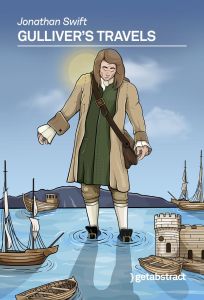
Gulliver's Travels
- Satire
- Enlightenment
What It’s About
A Satire of Society
With Gulliver’s Travels into Several Remote Nations of the World, the Anglo-Irish cleric and writer Jonathan Swift (1667–1745) created one of the most absurdist pieces of literature of his (and maybe even all) time. On four consecutive journeys out to sea, surgeon and prospective ship captain Lemuel Gulliver finds himself in strange lands and civilizations. There he meets the tiny Lilliputians; the giants of Brobdingnag; the erudite Laputians, who are highly intelligent but unable to cope with life; and finally the monkey-like Yahoos and their wise and rational rulers, the Houyhnhnms, who look like horses. Many readers consider Swift’s novel a classic of young adult literature, but in fact it isn’t as harmless as many people think. Behind the facade of adventure story and travel writing lurks a biting satire on English society during Swift’s time, as well as a harsh reckoning of humanity as a whole and its doubtful development.
Summary
About the Author
Jonathan Swift was born in Dublin on November 30, 1667, to English parents. His father, after whom he was named, died shortly before he was born, and his mother, Abigail Erick, sent him to live with his uncle Godwin Swift in England. Jonathan Swift returned to Ireland to attend Trinity College in Dublin. After finishing his studies in 1686, his mother found him a position as secretary and personal assistant to the English diplomat Sir William Temple. There, Swift met Esther Johnson, whom he nicknamed “Stella.” His relationship with her, as well as with another woman, Esther Vanhomrigh, whom he called “Vanessa,” is unclear. Under Temple’s influence, Swift published several political and religious essays and pamphlets, most of them anonymously under the pseudonym of Isaac Bickerstaff. His best-known work of this time is A Tale of a Tub, a satire against “the numerous and gross corruptions in religion and learning,” published in 1704. Other works include the critical poem A Description of a City Shower in 1710 and satires such as The Battle of the Books (1704) and A Modest Proposal for Preventing the Children of Poor People from Being a Burden to Their Parents or Country and for Making Them Beneficial to the Publick (1729). Swift was ordained a priest in Ireland in 1695 and was appointed vicar of Kilroot. Initially a staunch Whig supporter, Swift switched over to the Tories in 1710 as he couldn’t agree with the Whig stand on the situation in Ireland. He became editor of the Tory journal, The Examiner. Later, he was appointed dean of St. Patrick’s Cathedral, Dublin, as a reward for his services. He continued writing throughout the 1720s and early 1730s, including poems as well as political pamphlets. He started working in earnest on his greatest and best-known satire Gulliver’s Travels into Several Remote Nations of the World in 1721 and finished it by August 1725. Its success was immediate. During this time, Swift had close friendships with the poet Alexander Pope and the poet and dramatist John Gay. Throughout his life, Swift suffered from a form of vertigo, known today as Ménière’s disease. He was declared of “unsound mind” in 1742 due to his increasing dementia, and he died on October 19, 1745, in Dublin.








Comment on this summary